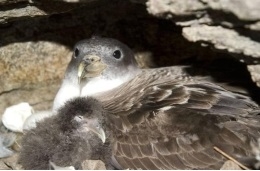Climate change also threatens the survival of seabirds
Finding food to feed baby birds is getting more and more difficult for seabirds due the effects of climate change, according to a study published in the journal Nature Climate Change, carried out by an international team with the participation of the lecturers Jacob González-Solís and Raül Ramos, from the Faculty of Biology and the Biodiversity Research Institute (IRBio) of the University of Barcelona.
According to the study, seabirds have not adopted their breeding cycle to the new climate conditions, which are marked by global change. In a future time, the progressive rise of sea temperatures could create a lack of synchrony between the breeding and feeding period and the stages in which preys are more abundant in oceans.
The new study is the global result of the collaboration of a big international team of experts on seabirds, which is led by the University of Edinburgh, the Centre for Ecology and Hydrology (CEH) and the British Antarctic Survey (BAS), from the United Kingdom. The new study, with the support of the Natural Environment Research Council of the United Kingdom, analysed the breeding patterns of sixty-two seabird species from 1952 to 2016, a period that has been marked by the significant rise of temperature in the sea.
How do seabirds respond to global change?
To contiune reading
